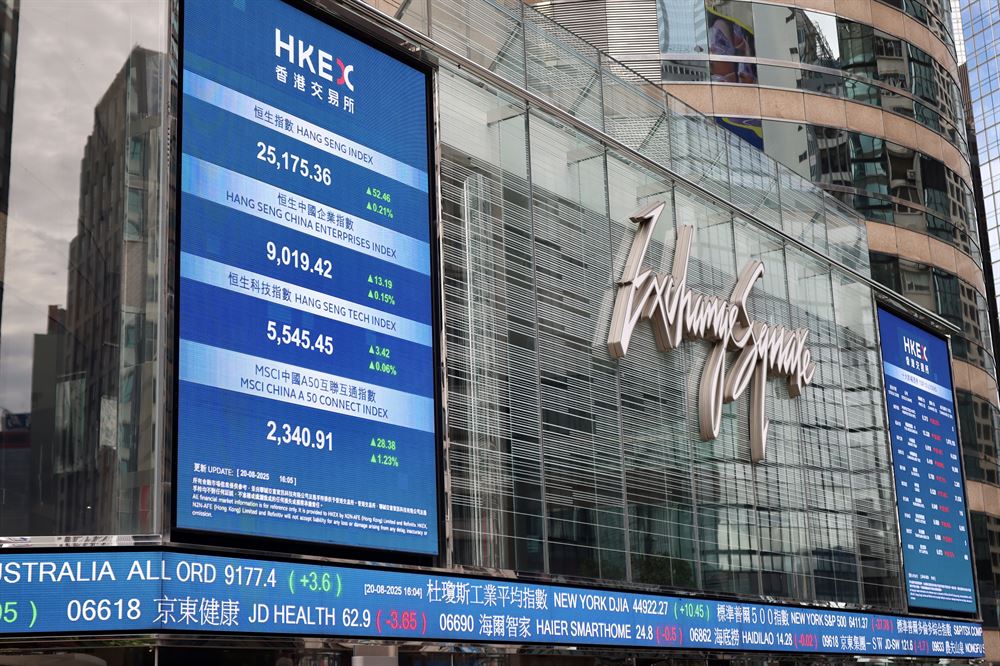
Hong Kong equities rebounded on Monday, ending a week of choppy decline, as investors bet on fresh interest rate cuts from the United States Federal Reserve after policymakers hinted there was room for further easing.
The benchmark Hang Seng Index rallied almost 2 percent to close at 25,716.5 points, while the Hang Seng Tech Index surged 2.8 percent. The Hang Seng China Enterprises Index, which tracks Chinese mainland firms listed in the city, advanced 1.8 percent.
Technology and healthcare shares led the rebound. Short video company Kuaishou leapt more than 7 percent, followed by NetEase and Hansoh Pharmaceutical Group, up 5.9 percent and 5.3 percent, respectively.
Alibaba rose 4.7 percent after its artificial intelligence chatbot Qwen drew more than 10 million downloads within a week of public launch, reportedly seeing its user base grow faster than those of ChatGPT and DeepSeek.
ALSO READ: Global alternatives investment gains steam, HK takes regional lead
Market sentiment improved after John Williams, president and CEO of the Federal Reserve Bank of New York, signaled that cooling US labor conditions and easing inflation pressures opened the door to “a further adjustment in the near term to the target range for the federal funds rate”.
Following his remarks, Goldman Sachs projected a rate cut next month. Chief Economist Jan Hatzius said, “We expect another Fed cut in December, followed by two more moves in March and June 2026 that take the funds rate to 3 to 3.25 percent.”
According to the latest CME FedWatch data, the probability of a rate cut at the Fed’s December meeting has climbed to over 70 percent, with mounting bets that rates could drop to 2.75 to 3 percent by the end of 2026. This was mainly driven by a shift in tone among Fed officials, said Arnold Tam, chief analyst at Futu Securities.
READ MORE: CE: Upcoming five-year plan offers clearer vision of HK's growth path
Tam said global market turbulence has begun to concern policymakers. Major indices worldwide have posted their sharpest declines of the year over the past month, he noted, citing tighter financial liquidity as one of the main factors.
But as expectations for Fed rate cuts increase, liquidity risks are gradually receding, which could inject new momentum into markets, Tam added.
In addition, Conita Hung, a member of the executive committee at the Hong Kong Institute of Financial Analysts and Professional Commentators, said the recent losses in Hong Kong equities had left “technical room” for a rebound. Since peaking in early October, the Hang Seng Index and Hang Seng Tech Index have retreated by as much as 8 percent and 20 percent, respectively.
READ MORE: Financial services tokenization to bring global business potential
Looking at the remainder of the year, Hung said two forces will continue to influence sentiment, namely US economic data, and anxiety over the profit outlook and heavy spending of America’s tech giants. These could trigger volatility in US stocks, she said.
Although the spillover to Hong Kong’s traditional market sectors may limited, Hung said she expects these traditional stocks to see profit-taking before year-end, with part of that capital flowing to second-tier technology names.
The ceiling for the Hang Seng Index this year would be 27,000 points, while the previously projected 28,000 points is difficult to reach, she added.
Contact the writer at irisli@chinadailyhk.com


